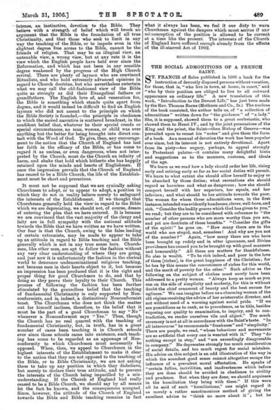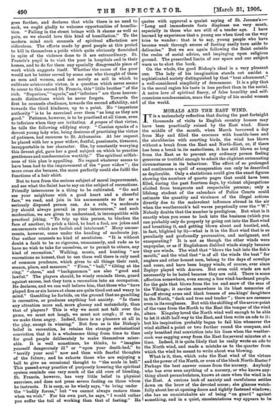THE SOCIAL ADMONITIONS OF A FRENCH SAINT.
ST. FRANCIS of Sales published in 1603 a book for the instruction of devoutly disposed persons without vocation, for those, that is, "who live in town, at home, in court," and "who by their position are obliged to live to all outward appearance an ordinary life." A new translation of this work, "Introduction to the Devout Life," has just been made by the Rev. Thomas Barns (Methuen and Co., 28.) The nucleus of the book consisted, the author tells us, of "a collection of admonitions" written down for "the guidance" of "a lady." She, it is supposed, showed them to a great ecclesiastic, who showed them to Henri IV., and by the joint persuasions of the King and the priest, the Saint—then Bishop of Geneva—was prevailed upon to recast his "notes" and give them the form of a book. As a manual of devotion the work has been popular ever since, but its interest is not entirely devotional. Apart from its piety—too sugary, perhaps, to appeal strongly to Protestant palates—it contains many delightful hints and suggestions as to the manners, customs, and ideals of the age.
We learn as we read how a lady should order her life, rising early and retiring early so far as her social duties will permit. We learn to what extent she should allow herself to enjoy or be absorbed by those duties; what recreations she should regard as harmless and what as dangerous ; how she should comport herself with her superiors, her equals, and her inferiors ; and what should be her attitude towards the poor. The woman for whom these admonitions were, in the first instance, intended was evidently handsome, clever, well-born, and rich. "Consider the bodily graces which God has given to you," we read; but they are to be considered with reference to "the number of other persons who are more worthy than you are, and yet are destitute of these benefits." "Consider the gifts of the spirit!" he goes on. "How many there are in the world who are stupid, mad, senseless ! And why are you not of the number ?" Again, "how many there are who have been brought up rudely and in utter ignorance, and Divine providence has caused you to be brought up with good manners and honourably." All these are matters for thankfulness. So also is wealth. "To be rich indeed, and poor in the love of them [riches], is the great happiness of the Christian ; for he has by this means the convenience of riches for this world, and the merit of poverty for the other." Such advice as the following on the subject of clothes must surely have been addressed to a pretty woman. "Always keep as much as you can on the side of simplicity and modesty, for this is without doubt the chief ornament of beauty and the best excuse for ugliness." We can imagine before us a charming woman of the old regime receiving the advice of her aristocratic director, and not without need of a warning against social pride. "If we are punctilious as to rank, as to precedence, as to title, besides exposing our quality to examination, to inquiry, and to con- tradiction, we render ourselves vile and abject." Too much ceremony is not at all in accordance with the Saint's taste. "In all intercourse" he recommends "frankness" and "simplicity." There are people, we read, "whose behaviour and movements are so artificial that every one is wearied with it." They "do nothing except in step," and "are exceedingly disagreeable in company." He deprecates strongly too much consideration of social details, and too much regret for social mistakes. His advice on this subject is an odd illustration of the way in which the soundest good sense cannot altogether escape the influence of a prevalent moral affectation. He speaks of "certain follies, incivilities, and inadvertences which before they are done should be avoided in obedience to civility and prudence. But when they are done, we should acquiesce in the humiliation they bring with them." If this were all he said of such "humiliations," one might regard it as merely a rather sanctimonious method of giving the excellent advice to "think no more about it "; but he goes further, and declares that while there is no need to seek, we ought gladly to welcome opportunities of humilia- tion. "Falling in the street brings with it shame as well as pain, so we should love this kind of humiliation." To the modern mind such counsels of spiritual affectation are ridiculous. The efforts made by good people at this period to kill in themselves a pride which quite obviously flourished in spite of the violence done to it are extraordinary. St. Francis's pupil is to visit the poor in hospitals and in their homes, and to do for them any specially disagreeable piece of work which suggests itself. Whether the cause of the poor would not be better served by some one who thought of them as men and women, and not merely as soil in which to cultivate aristocratic virtue, is a question which never seems to occur to this second St. Francis, this " little brother "of the rich. "Superiors," "equals," and "inferiors" are three heaven- made distinctions which he never forgets. Towards the first he counsels obedience, towards the second affability, and towards the third kindness, up to a point. No "imperious authority" is to be exercised over them "as long as they are good." Patience, however, is to be practised at all times, even to inferiors when they are irritating. A propos of that virtue, be tells the following edifying story. " Cassian speaks of a devout young lady who, being desirous of practising the virtue of patience, had recourse to St. Athanasius. At her request he placed with her a poor widow, fretful, passionate, tiresome, insupportable in her character. She, by constantly worrying this devout girl, gave her a good subject on which to practise gentleness and condescension worthily." The spiritual selfish- ness of this plan is appalling. No regard whatever seems to have been had to the improvement of the "poor widow"; the more cross she became, the more perfectly could she fulfil the functions of a hair shirt.
But to turn from the serious subject of moral improvement, and see what the Saint has to say on the subject of recreations. Friendly intercourse is a thing to be cultivated. "Go and see your neighbour with a good heart and a cheerful face," we read, and join in his amusements so far as a seriously disposed person can. As a rule, "a moderate joy should always prevail in your intercourse," and such moderation, we are given to understand, is incompatible with practical joking. "To trip up this person, to blacken the face of another, to prick a third, to hurt a fool, are jokes and amusements which are foolish and intolerant." Many amuse- ments, however, come under the heading of moderate joy. Our author counsels no kind of asceticism. "It is without doubt a fault to be so rigorous, unmannerly, and rude as to have no wish to take for ourselves, or to permit to others, any kind of recreation." Walking, music, and hunting "are recreations so honest, that to use them well there is only need of common prudence, which gives to all things their rank, season, place, and measure." "Fives," "ball," "tilting at the ring," "chess," and "backgammon" are also "good and lawful." The players should, be wisely reminds them, guard against excess, lest they turn a recreation into an occupation. He declares, and we can well believe him, that those who "have played five or six hours at chess are quite tired out and weary in mind." Gambling he forbids, on the ground that no gambling is recreative, or produces anything but anxiety. "Is there any attention more sad, more gloomy and melancholy, than that of players? This is why we must not talk over the game, we must not laugh, we must not cough ; if we do, we make them angry. Indeed, there is no pleasure at all in the play, except in winning." But firm as is the Bishop's belief in recreation, he retains the strange ecclesiastical conviction that it is a wholesome thing from time to time for good people deliberately to make themselves miser- able. It is well sometimes, he thinks, to "imagine yourself dangerously ill" or "upon your death-bed," to "terrify your soul" now and then with fearful thoughts of the future; and be exhorts those who are enjoying a ball to give an occasional thought to "the souls in hell." This passed-away practice of purposely lowering the spiritual system reminds one very much of the old cure of bleeding. St. Francis, however, has very little belief in physical exercises, and does not press severe fasting on those whom be instructs. It is easy, as he wisely says, "to bring under the "bodily forces," but "we cannot always restore them when we wish." For his own part, he says, "I would rather you suffer the toil of working than that of fasting." He quotes with approval a quaint saying of St. Jerome's:— "Long and immoderate fasts displease me very much, especially in those who are still of a tender age. I have learned by experience that a young ass when tired on the way tries to wander: that is to say, young people who have become weak through excess of fasting easily turn aside to delicacies." But we are again following the Saint outside the realm of social advice, and impinging upon religious ground. The prescribed limits of our space and our subject warn us to shut the book.
On the whole, the good Bishop's ideal is a very pleasant one. The lady of his imagination stands out amidst a sophisticated society distinguished by that "best adornment," a well-considered simplicity of demeanour. It is a pity that in the moral region his taste is less perfect than in the social. A naïve love of spiritual finery, of false humility and self- conscious condescension, mars the dignity of his model woman of the world.











































 Previous page
Previous page